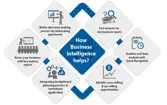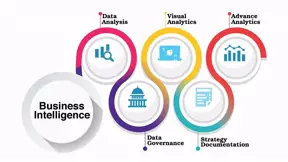Business intelligence (BI) Engineer Jobs
1. What is a Business Intelligence (BI) Engineer?
A Business Intelligence (BI) Engineer is an IT professional specializing in data analysis and building management information systems to support business decision making. Their job is to integrate data from multiple sources, develop analytical models, and create reports and data visualizations to help businesses better understand their performance and make strategic decisions.
The responsibilities of a BI Engineer typically include:
-
Collecting and processing data
-
Analyzing and transforming data
-
Building and maintaining BI systems
-
Analyzing and visualizing data
-
Supporting business decision making
By helping organizations understand and leverage their data, BI Engineers play an important role in shaping business strategies and enhancing competitive advantage.
BI Engineers are responsible for developing and maintaining BI interfaces, which include query tools, data visualization dashboards, ad-hoc reporting, and data modeling tools. However, as we are talking about business intelligence, we need to provide a tighter explanation of this technology concept.

2. Roles of a BI Engineer
The project scope defines the level of involvement for each role in a specific project, as engineers often have equivalent skills and knowledge and can replace each other. In developing Business Intelligence (BI) interfaces, engineers require in-depth knowledge of software technology, databases, and data analysis. To an extent, experienced data engineers with software development and BI experience can take leadership roles in interface development processes.
Responsibilities of a BI developer include:
-
Define business requirements for BI tools
-
Translate business requirements into specific technical requirements
-
Develop, deploy and maintain leading BI software
-
Design and implement reports and data modeling
-
Participate in data warehouse design and implementation
-
Record data warehouse content and metadata storage
-
Create technical documentation for BI tools
Additionally, BI engineers work closely with business stakeholders to understand their needs, with data analysts to define models, and with IT teams to ensure technical integration. Project management skills are required for planning, coordination and deliverable tracking.

3. Aniday shares some of the skills a Business Intelligence (BI) Engineer needs:
-
Experience using BI tools such as Tableau, Power BI, QlikView, etc.
-
Foundation in database administration and development
-
Foundation in data analysis, data modeling
-
Business analysis skills, strategic thinking
-
Programming skills, web development
-
User interface design skills
-
Troubleshooting, issue handling skills
-
Teamwork skills, presentation skills
-
Foreign languages like English

4. Common strategies for Business Intelligence
- Self-service BI: Allows end users to analyze data independently without the intervention of IT experts, enabling flexible data access and exploration.
- Cloud BI: Utilizes cloud services to store, process, and transmit data, providing cost savings, increased flexibility, security, and scalability for BI systems.
- Mobile BI: Enables access to and use of BI tools on mobile devices like smartphones and tablets, enhancing mobility, response time, and user interaction.
- Embedded BI: Integrates BI tools into other business applications, enhancing data access and usage, and improving alignment, consistency, and efficiency of business processes.








